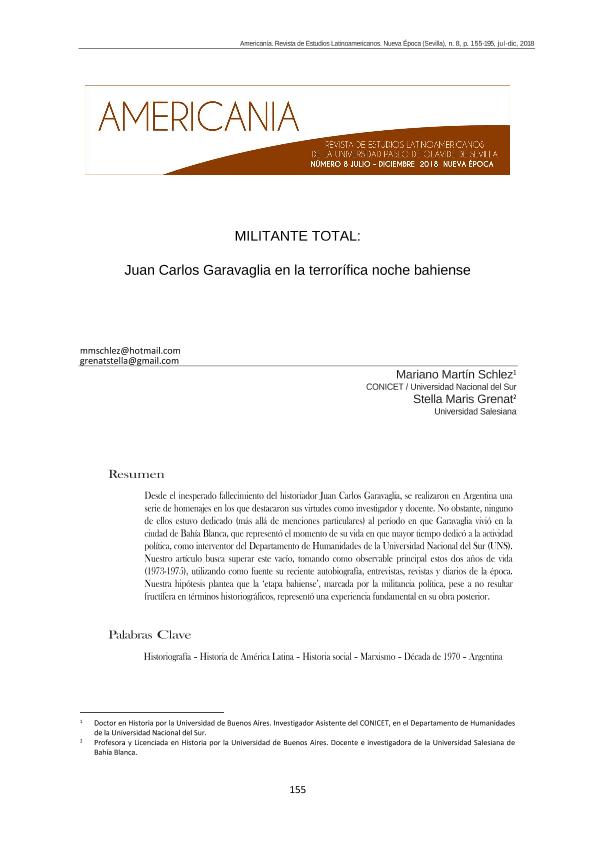Mostrar el registro sencillo del ítem
dc.contributor.author
Schlez, Mariano Martín

dc.contributor.author
Grenat, Stella Maris

dc.date.available
2020-01-06T15:26:39Z
dc.date.issued
2018-12
dc.identifier.citation
Schlez, Mariano Martín; Grenat, Stella Maris; Militante total: Juan Carlos Garavaglia en la terrorífica noche bahiense; Universidad Pablo de Olavide de Sevilla; Americanía; 8; -12-2018; 155-195
dc.identifier.issn
2174-0178
dc.identifier.uri
http://hdl.handle.net/11336/93607
dc.description.abstract
Desde el inesperado fallecimiento del historiador Juan Carlos Garavaglia, se realizaron en Argentina una serie de homenajesenlos que destacaron sus virtudes como investigador y docente. No obstante, ninguno de ellos estuvo dedicado (más allá de menciones particulares) al período en que Garavaglia vivió en la ciudad de Bahía Blanca, que representó el momento de su vida en que mayor tiempo dedicó a la actividad política, como interventor del Departamento de Humanidades de la Universidad Nacional del Sur (UNS). Nuestro artículo busca superar este vacío, tomando como observable principal estos dos años de vida (1973-1975), utilizando como fuente su reciente autobiografía, entrevistas, revistas y diarios de la época. Nuestra hipótesis plantea que la ‘etapa bahiense’, marcada por la militancia política, pese a no resultar fructífera en términos historiográficos, representó una experiencia fundamental en su obra posterior.
dc.description.abstract
Since the unexpected death of the historian Juan Carlos Garavaglia, a series of tributes were held in Argentina, which highlighted both his virtues as a researcher and teacher. However, none of them was dedicated (beyond specific mentions) to the period inwhich Garavaglia lived in the city of Bahía Blanca, which represented the moment of his life in which he devoted most time to political activity, as a controller of the Department of Humanities of the National University of the South (UNS). Our article seeks to overcome this void, taking as main observation these almost three years of his life (1973-1975), taking as a source his recent autobiography, interviews, magazines and newspapers of the time. Our hypothesis suggests that the ‘Bahian stage’, marked by political militancy, despite not being fruitful in historiographical terms, represented a fundamental experience in his later work.
dc.format
application/pdf
dc.language.iso
spa
dc.publisher
Universidad Pablo de Olavide de Sevilla
dc.rights
info:eu-repo/semantics/openAccess
dc.rights.uri
https://creativecommons.org/licenses/by-nc-sa/2.5/ar/
dc.subject
HISTORIOGRAFÍA
dc.subject
HISTORIA DE AMÉRICA LATINA
dc.subject
HISTORIA SOCIAL
dc.subject
MARXISMO
dc.subject
DECADA DE 1970
dc.subject
ARGENTINA
dc.subject.classification
Historia

dc.subject.classification
Historia y Arqueología

dc.subject.classification
HUMANIDADES

dc.title
Militante total: Juan Carlos Garavaglia en la terrorífica noche bahiense
dc.title
Juan Carlos Garavaglia in the terrifying night of Bahía Blanca
dc.type
info:eu-repo/semantics/article
dc.type
info:ar-repo/semantics/artículo
dc.type
info:eu-repo/semantics/publishedVersion
dc.date.updated
2019-10-23T17:31:54Z
dc.journal.number
8
dc.journal.pagination
155-195
dc.journal.pais
España

dc.journal.ciudad
Sevilla
dc.description.fil
Fil: Schlez, Mariano Martín. Universidad Nacional del Sur. Departamento de Humanidades. Área Historia Americana y Argentina; Argentina
dc.description.fil
Fil: Grenat, Stella.
dc.journal.title
Americanía
dc.relation.alternativeid
info:eu-repo/semantics/altIdentifier/url/https://upo.es/revistas/index.php/americania/article/view/3801
Archivos asociados
